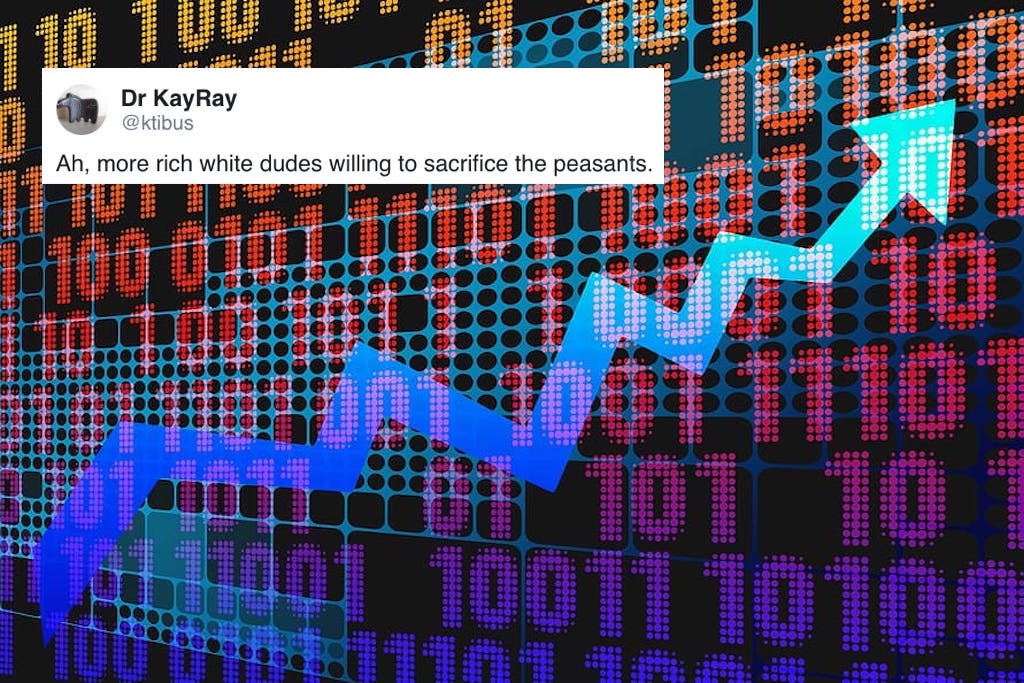Surprise Surprise: Young Australians Will Cop The Worst Of The Coronavirus Pandemic
"If you’re entering the workforce now, you’re not only battling stagnant wages, unaffordable housing and the climate crisis, you’re trying to get into a job market that’s collapsing around you."

Just entering the workforce? Congratulations, that shitty timing will cost you a house deposit down the track.
In more terrible finance news for young Aussies (sorry), new modelling shows that people looking to nab their first job in during the COVID-19 crisis could earn an average of $35,000 less over the next decade — and that’s being conservative.
That’s due to a fun little thing called employment scarring, which basically refers to the long-term negative consequences that flow on from a bad experience early in people’s working lives.
Hate to break it to you, but it really doesn’t get much worse than a global economic crisis.
Employment scarring happens partly because workers who enter the job market during a downturn find it harder to find employment, so are forced to accept lower-paid jobs, which then take time to work up from.
That’s assuming they can find any job at all.
Jeff Borland, an economics professor from the University of Melbourne, spoke to Junkee about his latest labour market snapshot and how scarring might impact the earning potential of young Australians.
In summary, he found this; studies have shown entering the job market when employment is down three or four percentage points leads to people’s annual earnings dropping three to six percent for a decade.
1) many Aussies will never get a job again after this. a new generation will be locked out of work for years
2) even the “deserving unemployed” will struggle to find their jobs waiting for them in 6 months
3) i hope Morrison’s ready for riot & rebellion when he cuts Newstart https://t.co/0JPTUtNraC— jeremy poxon (@JeremyPoxon) April 29, 2020
Kiss Your House Deposit Goodbye
Modelling was done by the Greens — based on Borland’s research, and based on the average 24-year-old’s annual income (around $57,403 based on ABS data) — and found this added up to a loss of around $34,442 across a decade. Or, around six months of working for free.
But Borland said they might even be lowballing that.
“The job losses we’ve already seen from the ATO payroll data last week, we’re already almost at that level, so by basing the number on a three percentage point increase in unemployment I think they’re being quite conservative,” he said.
The gfc and the subsequent shitting up of the work industry (freelancing, gig economy) pretty much torpedoed my career. This will make the gfc look like a picnic
— JOIN THE AUWU (and ban brioche burger buns) (@jezheywood) April 29, 2020
Assuming there's jobs to get back into
— Pam Mars (@PamMars05469311) April 29, 2020
Right now we’re bracing for a ten percent unemployment rate, up from five percent before the pandemic. That’s our highest rate in almost three decades, so it wouldn’t be a surprise if the impacts turn out to be worse than the modelling suggests.
Either way that’s a massive chunk out of the pay packets of a generation who will already be dealing with the fallout of a country trying to claw its way back from a recession.
Greens leader Adam Bandt said the research showed how important it was to prioritise young people’s needs, and ignoring this “is setting up the next generation to fail”.
“If you’re entering the workforce now, you’re not only battling stagnant wages, unaffordable housing and the climate crisis, you’re trying to get into a job market that’s collapsing around you,” he said.
“When you’ve got bills piling up and rent to pay, it can be tough to turn down a lousy job that barely pays the bills, if only to keep a roof over your head. All too often one bad job leads to another, so it’s really tough to get the experience and confidence needed to get the job you deserve.
“This $35,000 over a decade isn’t just loose change that could go to rent, it’s a housing deposit that’s been taken away from you, money that could pay off your car, or go into your savings to get ready for a rainy day.”
Maybe we should start forwarding all our job rejection emails to the PM’s office?
— Kathie Mayer (@kathmayer) April 29, 2020
Jeff said while things look bleak, the worst thing young people could do would give up and surrender to their economic fate.
Employment scarring tends to impact lower-skilled workers more, so anything people can do to improve their education or training, stay connected to the job market and stay motivated will help them when the economy does recover.
“There’s no doubt it’s an extremely difficult position for young people in the labour market and I think it’s really concerning and something the government needs to be worrying about,” Jeff said.
